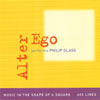Allter Ego performs Philip Glass
A different strategic approach to Glass – and the composer obviously approves
View record and artist detailsRecord and Artist Details
Composer or Director: Philip Glass
Genre:
Orchestral
Label: Orange Mountain Music
Magazine Review Date: 7/2007
Media Format: CD or Download
Media Runtime: 138
Mastering:
Stereo
DDD
Catalogue Number: OMM0034

Tracks:
| Composition | Artist Credit |
|---|---|
| Music in similar motion |
Philip Glass, Composer
Alter Ego Philip Glass, Composer |
| Strung Out |
Philip Glass, Composer
Alter Ego Philip Glass, Composer |
| Piece in the shape of a Square |
Philip Glass, Composer
Alter Ego Philip Glass, Composer |
| Gradus (for Jon Gibson) |
Philip Glass, Composer
Alter Ego Philip Glass, Composer |
| Music in contrary motion |
Philip Glass, Composer
Alter Ego Philip Glass, Composer |
| 600 lines |
Philip Glass, Composer
Alter Ego Philip Glass, Composer |
| How now |
Philip Glass, Composer
Alter Ego Philip Glass, Composer |
Author: Philip_Clark
Italian ensemble Alter Ego have made their name playing the post-minimalism of composers as diverse as Louis Andriessen, David Lang and Frederic Rzewski. Now they turn their attention to pre-, or perhaps more accurately, prototype minimalism in this fine two-disc survey of early Philip Glass. Rejecting the seamless cross-stitching and salamander slither of Glass’s own ensemble, Alter Ego opt for a brassier and more strident approach. This strategy proposes a subtly alternative view about which the composer obviously approves – Orange Mountain Music is his own label.
As Glass explains in his programme notes, 600 Lines and How Now (both 1968) were the first compositions written for his eponymous ensemble and were, in effect, “practice pieces”. The works are anchored around the ebb and flow of repetitive cycles that ripple outwards like a stone hitting a pond. The constant shifting sense of “1” is where main interest lies, a feature Alter Ego’s rhythmic assertiveness keenly highlights. Their default instrumentation of flute, clarinet, keyboards, electric guitar, mallet percussion, violin and cello adds a timbral flavour distinct from the trademark electric organ tone of the original.
The seminal Music in Similar Motion and Music in Contrary Motion (both 1969) are similarly revitalised, and the rarely heard instrumental works are a delight. Strung Out (1967) for solo violin takes a line for a marathon zigzagging walk and is brilliantly traversed by Francesco Peverini, while the charming Piece in the Shape of a Square (1968) for two flutes moves through stealth-like harmonic fields, with an atmosphere of intense misterioso.
As Glass explains in his programme notes, 600 Lines and How Now (both 1968) were the first compositions written for his eponymous ensemble and were, in effect, “practice pieces”. The works are anchored around the ebb and flow of repetitive cycles that ripple outwards like a stone hitting a pond. The constant shifting sense of “1” is where main interest lies, a feature Alter Ego’s rhythmic assertiveness keenly highlights. Their default instrumentation of flute, clarinet, keyboards, electric guitar, mallet percussion, violin and cello adds a timbral flavour distinct from the trademark electric organ tone of the original.
The seminal Music in Similar Motion and Music in Contrary Motion (both 1969) are similarly revitalised, and the rarely heard instrumental works are a delight. Strung Out (1967) for solo violin takes a line for a marathon zigzagging walk and is brilliantly traversed by Francesco Peverini, while the charming Piece in the Shape of a Square (1968) for two flutes moves through stealth-like harmonic fields, with an atmosphere of intense misterioso.
Discover the world's largest classical music catalogue with Presto Music.

Gramophone Digital Club
- Digital Edition
- Digital Archive
- Reviews Database
- Full website access
From £8.75 / month
Subscribe
Gramophone Full Club
- Print Edition
- Digital Edition
- Digital Archive
- Reviews Database
- Full website access
From £11.00 / month
Subscribe
If you are a library, university or other organisation that would be interested in an institutional subscription to Gramophone please click here for further information.




